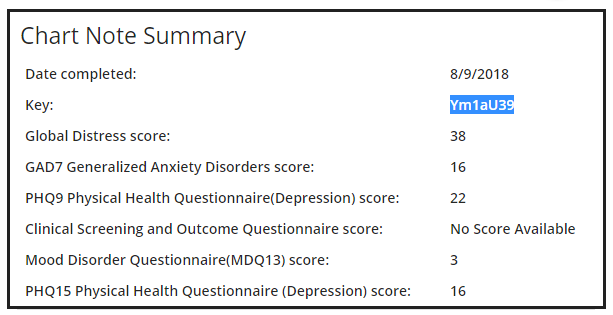Understanding Your Questionnaire Results
The questionnaire you completed is an internationally recognized standard for identify thoughts, feelings, physical symptoms and behaviors that could be associated with physical and/or mental health problems.
Screening alone is not sufficient to make a diagnosis.
Scores that are moderate or above indicate that you should speak with a qualified medical or mental health professional.
Note: Questionnaire results are not 100% correct. Greater scores means you are probably in more distress than people with lover scores. The greater the score the more important it may be to get a qualified opinion.
The KEY
The questionnaire you completed is completely anonymous. Be sure to save the KEY (highlighted in blue) so that your therapist can view the results. Only therapists on the site can access the report, but you must give them the KEY. The KEY must be entered with upper and lower case. The note can become chart note if you give the results to you therapist.
Interpreting Individual Questionnaires
GAD7 Generalized Anxiety Disorders
GAD7 scores of 5, 10, and 15 represent minimum for mild, moderate, and severe anxiety, respectively. Though designed primarily as a screening and severity measure for generalized anxiety disorder, the GAD7 also has moderately good operating characteristics for three other common anxiety disorders such as panic disorder, social anxiety disorder, and post-traumatic stress disorder. When screening for additional anxiety disorders, a recommended minimum for further evaluation is a score of 10 or greater.
PHQ9 Physical Health Questionnaire (Depression)
PHQ9 scores of 5, 10, 15, and 20 represent minimum for mild, moderate, moderately severe and severe depression, respectively. Depression can be associated with other conditions including anxiety, other mood disorder, stress, problems adjusting, grief and sleep disorders.
GLOBAL Distress
The GD score is the sum of the GAD7 and the PHQ9. This score capture the overall distress patients feel as a result of all any mental health challenge, problem or disorder.
This includes:
social,
financial,
family,
educational,
employment,
legal,
marital,
relationship struggles,
previous or recent trauma,
health,
mental health
CSOQ Clinical Screening & Outcome Questionnaire
The CSOQ are supplemental questions that have clinical value. The questions support and guide further interview.
MDQ13 Mood Disorder Questionnaire (Mood)
MDQ13 scores greater than 7 is considered significant if the person believes several of these have happened over the same period of time. You should speak with a counselor or you doctors if you score is over 7.
PHQ15 Physical Health Questionnaire (Medical)
PHQ15 scores of 5, 10, and 15 represent minimum for low, medium, and high somatic symptom severity, respectively. Physician are often confused by patients who report physical symptoms that are the result of mental and emotional stress that can cause many of these symptoms. Nearly 80% of patients report one or more symptoms of mental and emotional stress. Physician will often screen for symptoms of psychological stress they they can't find an organic cause for a high number physical symptoms. A high score DOES NOT mean your symptoms are "in your head." It means you may have a rare physical illness. Or, it may also means that a moderate to high level of distress means that your body is feeling the physical consequences of:
muscle tension,
stress hormones,
adrenaline,
lack of sleep,
physical exhaustion,
changes in blood pressure,
rapid breathing and heart rate,
high CO2, etc...
